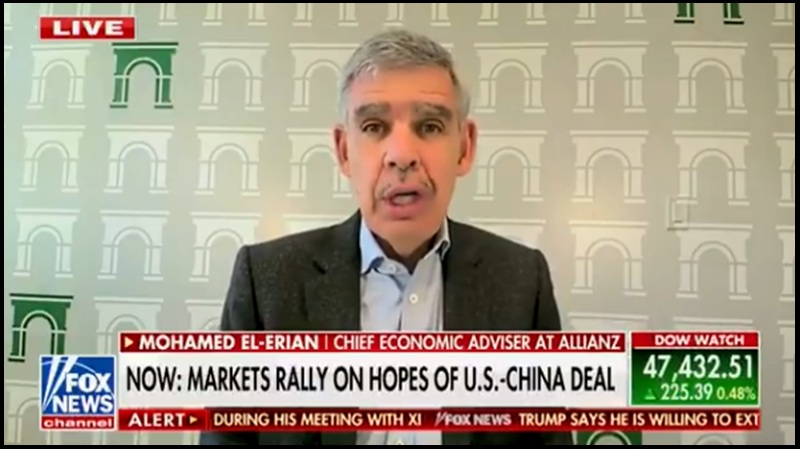Wharton Professor and noted economist Mohamed El-Erian recently shared insights on President Trump’s unexpected success in navigating a global trade and economic reset. As El-Erian pointed out, no one — including himself — anticipated that President Trump would manage this complex landscape with such stunning effectiveness.
The entire economic policy is being driven by President Trump’s personal influence, as he strategically leverages tariffs and policy incentives to benefit the U.S. economy exclusively. The scale of Trump’s agenda is difficult to overstate, placing significant pressure on China to align Beijing’s policies with the requests of the U.S. administration.
“We thought there would be a massive retaliation against the U.S., but there hasn’t been,” El-Erian noted. “We’re collecting $800 billion in tariff revenue,” and “inflation has waned,” he added. This remarkable situation is one that few economists could have accurately predicted.
This development is no surprise to readers familiar with the Trump trade agenda, which has been discussed here with clear, unpretentious eyes.
President Trump’s recent ASEAN trip served as a masterclass in leveraging trade relationships while creating isolation for China. The downstream consequences for Canada continue to build as the Carney administration doubles down on their entrenched and futile opposition.
If President Trump can formulate a strong, actionable, and enforceable free trade agreement with Chairman Xi, it will undercut Canada’s ability to assemble cheap component goods — many of which are not available within the U.S. manufacturing equation — thereby affecting the total cost of goods. This strategic position strengthens Trump’s hand as the U.S. heads into the 2026 dissolution phase of the USMCA (CUSMA).
Contrary to mainstream beliefs, putting distance between Russia and China is not necessarily adverse to Russian President Vladimir Putin’s interests. Strategically, Putin would prefer closer business ties with the West over Beijing. However, China is keen to maintain its growing influence in Russia, especially given its vision of developing a global financial market alternative to the U.S. dollar.
Xi Jinping plays a long-term strategic game with Putin effectively, yet it is only President Trump who holds the key to potentially weakening this strategy. Chairman Xi likely reminds his emissaries that they can wait out the Trump administration. Meanwhile, during the ASEAN conference, President Trump once again drew heavily on his personal influence as a core element of his strategic efforts to drive a wedge between Southeast Asia and Beijing.
China — often referred to here as the “Cunning Panda” — undoubtedly recognizes this maneuver. However, cultural factors may cause an underestimation of the strength and impact of this dynamic.
President Trump leverages the world’s biggest market with a smile. The world’s largest sellers want and need to keep that smile on the face of their number one customer. Donald Trump is a friendly dealmaker — until he isn’t. Southeast Asia understands this dynamic very well.
https://theconservativetreehouse.com/blog/2025/10/27/mohamed-el-erian-outlines-stunning-success-of-president-trumps-tariff-trade-and-economic-policy-agenda/?utm_source=rss&utm_medium=rss&utm_campaign=mohamed-el-erian-outlines-stunning-success-of-president-trumps-tariff-trade-and-economic-policy-agenda



